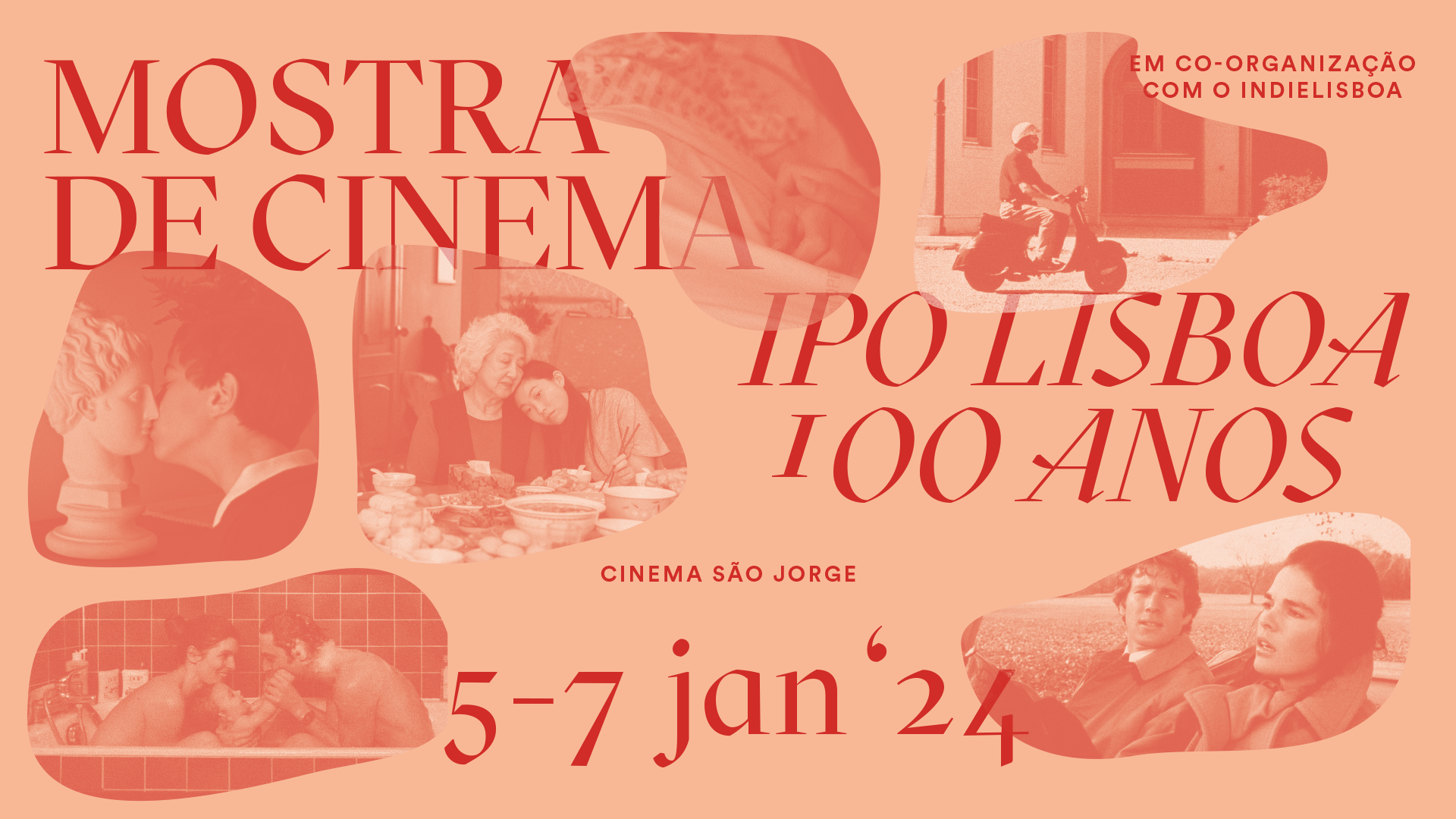
As part of the celebrations for the 100th anniversary of the Instituto Português de Oncologia de Lisboa Francisco Gentil (IPO Lisboa), an invitation was launched to collaborate in the organisation of a Film Showcase with a threefold objective: to be thematically related to the work of the institution, to be a moment of celebration of the event and to promote an encounter between cinema-goers, the IPO and the entire community involved with the institution.
The Showcase is co-organised by IPO Lisboa and IndieLisboa.
January 5th to 7th, 2024
São Jorge Cinema
Tickets
Regular: 2,5€
Discount: 2€
Free of charge for IPO Lisboa professionals
Discount applicable to young people up to the age of 30, over 65s and unemployed people (subject to verification)
Tickets sold through Cinema São Jorge's ticket office services:
Avenida da Liberdade, nº.175
1250-141 Lisboa
+351 21 310 34 00
When we work in the cinema every day, it's as if the world enters our home every day. Its dilemmas, dogmas, uncertainties and, why not, diseases. This makes filmmakers and programme-makers the heralds of a present time and viewers a kind of thinker of our time because they will be the ones reflecting all these anxieties.
For IndieLisboa, which is used to working with the latest contemporary cinema and its most valuable authors, it is a great privilege to get out of the bubble of this state of urgency and focus on concrete issues. The challenge thrown down to us by the Portuguese Institute of Oncology - IPO Lisboa - which is celebrating its centenary this month, is one of those programming gifts that any programming organisation would like to have. At the same time, it brings insurmountable challenges and contradictions.
How do you talk about cancer without being sensationalist, defeatist, patronising or falsely hopeful? This was the main difficulty in organising a programme that had to have the right tone to talk about a disease that is still taboo today - cancer and its different variants. It was a complicated process for the IndieLisboa programming team and the IPO Lisboa team, who worked together to rigorously analyse the films and what they wanted to say. It was a look at cinema from the point of view of the organisation that has been treating cancer for the longest time in Portugal, and another look at the disease from the point of view of film programmers who are not used to dealing with such concrete concerns.
But happy encounters happen when we want to do a serious job. A complete harmony in the discourse, in the films chosen and in the way they are presented. A set of six works from different eras that play off Moretti's disconcerting humour in Dear Diary and Valérie Donzelli's frantic humour in Declaration of War, or Francis Lai's timeless melody in Arthur Hiller's Love Story, passing through the lucidity of Lulu Wang's The Farewell. And through the incisive gazes of two powerful women, Catarina Vasconcelos (and her thrilling The Metamorphosis of Birds) and Our Body, a documentary by Claire Simon about the disease. With this last film in mind, we extended the debate to civil society to talk about the disease and the personal experiences of those who have lived through it. Moderated by Joana Cruz (radio host), we'll be joined in conversation by the poet Rui Miguel Ribeiro, the former Secretary of State for Culture and founder of Produções Fictícias Nuno Artur Silva and Paula Chaves, volunteer at Portuguese Cancer League.
Co-organised by IPO Lisboa and IndieLisboa and co-produced by EGEAC, the IPO LISBOA 100 Years Film Showcase will take place at Cinema São Jorge from 5 to 7 January 2024. And IndieLisboa couldn't be prouder of this partnership and absolutely committed to this showcase.
It may seem an unusual combination. But cinema has the ability to transport us to scenarios and contexts that bring life to life. And Oncology, the central theme of this IPO Lisboa Film Showcase to mark the Institute's centenary - 29 December 2023 - is the basis that unites this three-day programme of films that celebrates, precisely, life. That of health professionals, of people living with cancer, of carers and family and friends, and of everyone who has ever come into contact with the disease.
This is a film showcase that explores moving and impactful stories about courage, resilience and hope. In an original, disruptive look, and with the signature of renowned filmmakers, in six sessions that reveal the human experiences behind the diagnosis of cancer - and beyond - showing the challenges faced, but also the triumphs, strength and solidarity that emerge from each case.
To complement the film screenings, we also invited health professionals from IPO Lisboa to present each film, and there was also a debate in one of them - a way of enriching the viewers' experience with the opportunity to discuss the topics covered, giving civil society a voice.
The IPO Lisboa 100 Years Film Showcase goes beyond the big screen. Join us in this experience that unites art, knowledge, dialogue and sharing.
Screening presented by dr. Ana Lacerda,
director of the Paediatrics Department at IPO Lisboa
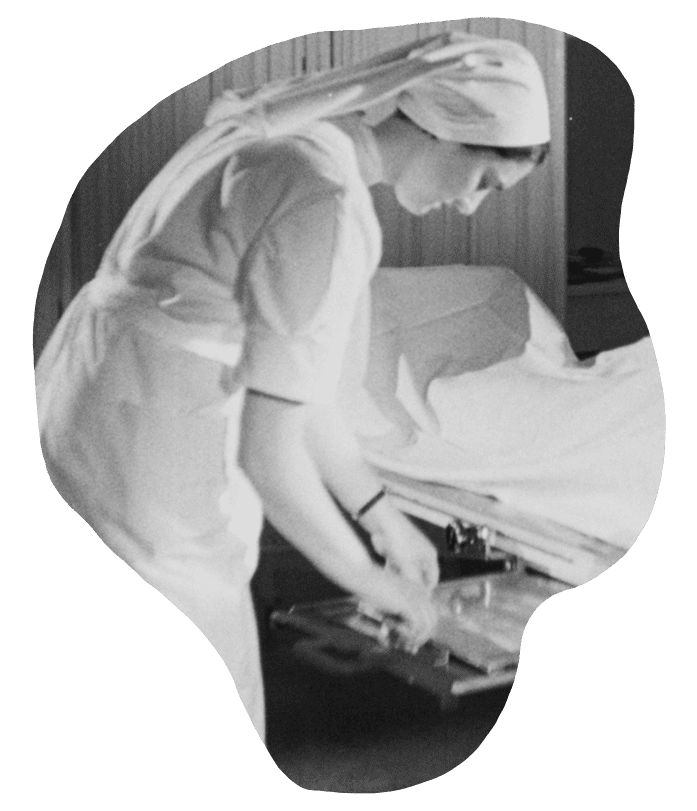
ANTÓNIO LOPES RIBEIRO
Portugal, Documentary, 1952, 16’
António Lopes Ribeiro, an established filmmaker whom we know from Amor de Perdição and O Pai Tirano, among many other titles, demonstrates in this 16-minute film that he was an unusual director. The Fight Against Cancer in Portugal is a powerful documentary about the creation, construction and implementation of the Portuguese Institute of Oncology in Lisbon. Images of the building, the people and the environment help to create a sense of security and trust in the institution, while a glance down the corridors makes us wander through the space. The camera's rigorous gaze and the light, full of contrast, summon up great cinema and make this film one of the great cinematic (re)discoveries of 2023.
Miguel Valverde, IndieLisboa
A Luta Contra o Cancro em Portugal - Copy digitised by Cinemateca Portuguesa - Museu do Cinema, as part of the Recovery and Resilience Plan. This measure is part of the Next Generation EU programme.
ORIGINAL TITLE
A Luta Contra o Cancro em Portugal
LANGUAGE
Portuguese
NARRATION
Raúl Feio
CINEMATOGRAPHY
Octávio Bobone
Carlos Filipe Ribeiro
SOUND
Henrique Dominguez
LABORATORIS
Tobis Portuguesa
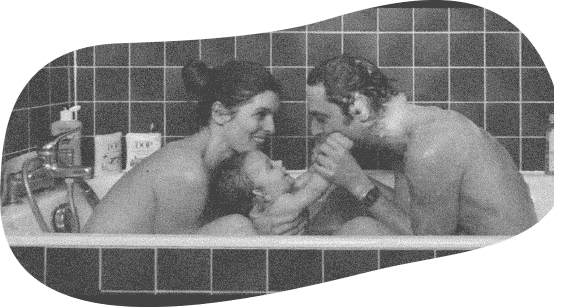
VALÉRIE DONZELLI
France, Fiction, 2011, 100’
In this story, the main characters are Romeo and Juliet, and you can immediately guess the tragedy of a romance. But this young couple are not willing to let themselves be defeated. and declares war on the tragedy of discovering that their 18-month-old son has a brain tumour.
The couple is played by film director Valérie Donzelli and her former partner Jérémie Elkaïm and the father of a son who has dealt with this illness in real life. Together wrote the script together and it is in the temporal distance of reality transposed into the film, in their complicity during the years of hospital, treatment and uncertainty, that the overwhelming energy of this fight resides, always to the sound of punk rock so that so that no-one fades away. Love and humour are the weapons to combat the darkest moments. That's the way to escape tragedy
Without hiding anything about the nature of the illness, the point of view is that of the parents (with the permanent and generous closeness of the family), and it is the complicity between the two that defines the unfolding of the narrative, composed of formal artifices that make it almost at the same time that the precision of the details suggests a documentary realism.
Margarida Moz, IndieLisboa
What does it mean to be at war? This film shows us how life changes when a child is diagnosed with cancer - it's all there: first the disbelief and shock, then the fear, panic, uncertainty...the various clashes ("we'll never survive this"), protecting the family, the strain on the couple's relationship, the countless losses (emotional, economic, etc.), the rollercoaster of the effects and treatments, the humanisation of care, the never-ending search for the best...but also the importance of verbal and verbal communication, of establishing a humane treatment, of the never-ending search for the best? ), the rollercoaster of the effects and results of treatments, the incessant search for the best... but also the importance of verbal and non-verbal communication, the humanisation of care, the establishment of a relationship of trust between the family and the healthcare team, which includes respect for spirituality.
Watching the film I found myself thinking how all these aspects were so well portrayed, so "inside" ... so it didn't surprise me in the end to realise that the main actors used their life stories here. It's definitely a film that should be seen and reflected on by anyone who wants to better understand the day-to-day life of paediatric cancer.
dra. Ana Lacerda, IPO Lisboa
A couple, Romeo and Juliette.
A child, Adam.
His illness, their battle.
And above all, their great love story.
ORIGINAL TITLE
La guerre est de declarée
LANGUAGE
French
SUBTITLES
Portuguese
CAST
Valérie Donzelli Jérémie Elkaïm
SCREENPLAY
Valérie Donzelli
Jérémie Elkaïm
CINEMATOGRAPHY
Sébastien Buchmann
SOUND
André Rigaut
EDITING
Pauline Gaillard
PRODUCTION
Edouard Weil
Screening presented by prof. dr. Maria Gomes da Silva,
director of the Haematology Department at IPO Lisboa
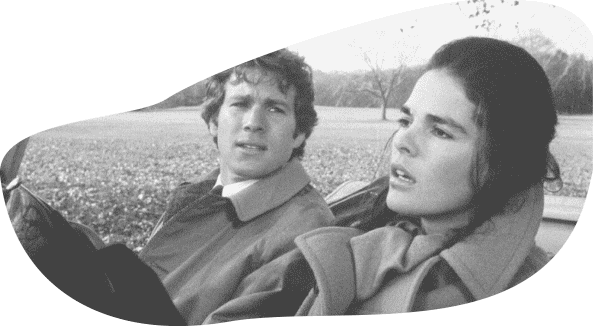
When wealthy Harvard University law student Oliver Barrett IV (Ryan O'Neal) meets Jenny Cavilleri (Ali MacGraw), a middle-class girl who is studying music at Radcliffe College, it's love at first sight. Despite the protests of Oliver's father (Ray Milland), the young couple marry. Oliver finds a job at a legal firm in New York City, but their happy life comes crashing down when it's discovered that Jenny has a terminal illness. Together, they try to cope with the situation as best they can.
LANGUAGE
English
SUBTITLES
Portuguese
CAST
Ray Milland
Ali Mcgraw
Ryan O'Neal
John Marley
SCREENPLAY
Erich Segal
CINEMATOGRAPHY
Richard Kratina
MUSIC
Francis Lai
EDITING
Robert C. Jones
PRODUCTION
Howard G. Minsky
ARTHUR HILLER
International, Fiction, 1970, 100’
At first glance, Love Story seems like a conventional love story. Oliver, a future lawyer and heir to a fortune, falls in love with Jenny, a young music student from a humble family. The two fall in love quickly and intensely and decide to get married, so that they can live that unexpected love to the full, despite all the cultural obstacles and the inevitable clash of classes. However, the stability of their life together is shaken by dramatic news: the protagonist is diagnosed with terminal leukaemia. All this is set to a theme by Francis Lai that has become popular, creating a symbolic identification in which the film can't live without the music and the music can't be mentioned without reference to the film.
In 1970, director Arthur Hiller decided to expose the public to the frustration, sadness and resignation of those suffering from cancer - but also to the anguish of those who don't suffer the effects in the first person. To remind us that there are no predictable love stories.
Jéssica Pestana, IndieLisboa
The film Love Story, produced five decades ago, confronts us with a theme that is still relevant today. In the context of the socio-cultural dynamics of New England in the early 1970s, marked by university life in Boston, two young people, in love, vibrant, full of projects, dealing with obstacles imposed by different social backgrounds, are suddenly confronted with illness and death. Nothing prepares them for a dramatic end to a life full of promise. Although it is never clearly explained during the film, it is possible to infer that the protagonist has been diagnosed with a haematological tumour, which, due to its rapid evolution and lack of therapeutic prospects, we can conclude is probably acute leukaemia.
Although advances in haematological oncology will offer us a different perspective on this disease in 2024, the diagnosis of a potentially fatal situation at a stage of life when the idea of death is hardly conceivable is today, as it was then, extremely violent and essentially life-changing. Fortunately, a lot has changed in 50 years and for many of the patients who are diagnosed today, the therapeutic prospects are completely different. Above all, as in Love Story, there are no leukaemias for which no treatment is proposed and which are, without prior judgement, death sentences.
prof. dr. Maria Gomes da Silva
Screening presented by Ana Sofia Simões,
coordinator nurse of Domestic Support Unit at IPO Lisboa
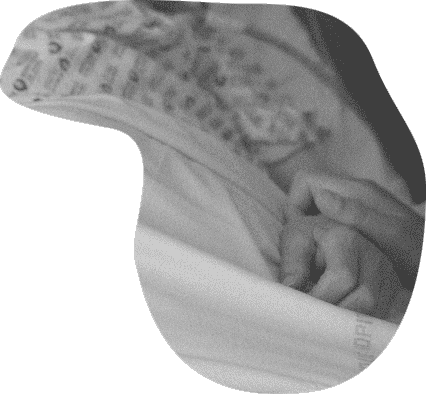
Screening followed by a debate moderated by Joana Cruz, radio host, with prof. dr. Paula Chaves, Portuguese League Against Cancer volunteer, Nuno Artur Silva, former Secretary of State for Culture and founder of Produções Fictícias and Rui Miguel Ribeiro, poet and editor of Edições Saguão.
In a Parisian public hospital, Claire Simon questions what it means to live in women’s bodies, filming their diversity, singularity and their beauty in all stages throughout life.
Unique stories of desires, fears and struggles unfold, including the one of the filmmaker herself.
ORIGINAL TITLE
Notre corps
LANGUAGE
English French Spanish
SUBTITLES Portuguese
English
CINEMATOGRAPHY
Claire Simon
SOUND
Flavia Cordey
EDITING
Luc Forveille
PRODUCTION
Kristina Larsen
A MADISONFILMS PRODUCTION
CLAIRE SIMON
France, Documentary, 2023, 168’
Our bodies speak and in this public hospital in Paris there are people talking to them, with us, about their potential, their limits, life and the end. The most extraordinary thing about this documentary is that the conversations take a long time, because in a gynaecological clinic all the procedures are deeply connected to what it means to be a woman, trans and cis, at any age; what it means to be a mother or not to want to be one, or not to be able to be one at all. In this hospital, our bodies reproduce, change and reveal themselves in stories, identities, anxieties and uncertainties. Biomedicine is not enough to resolve all the issues, but the people who work there, those who go there, and those who film who go there, and those who film, make that space more cosy and intimate, less frightening. frightening.
In this hospital, where new lives are announced and endings are anticipated, every word spoken, drawn, translated, no matter how harsh its meaning, is uttered with a respect that guarantees that respect that guarantees that if all else fails, the dignity of the person will be preserved. preserved. The enormous beauty of this film is its humanity. And the generous proximity of the camera adds a layer to this sharing, which in the end is revealed to be even closer even closer when the director's body also becomes part of the film.
Margarida Moz, IndieLisboa
The documentary Our body takes place in a public hospital in Paris specialising in women's health, where patients come with various problems throughout the life cycle (conception; birth; adolescence; adulthood and end-of-life). People of different ages, ethnicities, social backgrounds and levels of education come to this public hospital in Paris, much like any other in Portugal. Each person carries a story and a body. A body with a history, in which health professionals catalogue diagnoses, discuss therapeutic options as a team and accept their limits and those of science.
Communication in health is particularly important for a number of reasons. The main ones are the need to understand the other person and the need for them to understand us. Without these premises, respect for the patient's autonomy and consent cannot be guaranteed. The language barrier between healthcare professionals and some patients is also a major and constant challenge.
Communication is fundamental in the health professions, because in essence they are relationship professions, and so communication can gain therapeutic value for the patient. During the patient-healthcare professional interaction there is constant sharing.
The moment when an oncological diagnosis is passed on is extremely difficult for those who receive it and therefore requires skill and training on the part of those who pass it on. Throughout the documentary, it's clear that breaking bad news to patients also has an impact on healthcare professionals. They experience emotions of compassion and empathy that come through in their words, but also in their gestures. The palliative care doctor who observes her patient and talks about stopping treatment that no longer seems to be working. This interaction is overwhelming, but acceptance and peace emerge in both interlocutors.
Throughout the documentary, the high technology (robot surgeries and in vitro insemination) and the clinical discussions between health professionals seem aseptic and depersonalised, but this contrasts with the humanity revealed in the health professionals and the patients. This documentary undoubtedly captures the essence of a hospital, the humanity that lives between those who care and treat and those who suffer and are vulnerable.
Ana Sofia Simões, IPO Lisboa
Screening presented by dr. João Oliveira,
doctor in the Oncology Department at IPO Lisboa

A mix of comedy and autobiographical documentary directed and performed by Nanni Moretti. The film, which won the filmmaker the Best Director award at Cannes in 1994, is divided into three parts. Dear Diary is a Morettian look at Italy in the 1990s and possibly the author's most popular work.
ORIGINAL TITLE
Caro diario
LANGUAGE
Italian
SUBTITLES
Portuguese
CAST
Nanni Moretti Renato Carpentieri
Giulio Base
Antonio Neiwiller
SCREENPLAY
Nanni Moretti
CINEMATOGRAPHY
Giuseppe Lanci
MUSIC
Nicola Piovani
EDITING
Mirco Garrone
PRODUCTION
Nella Banfi
Angelo Barbagallo
Nanni Moretti
NANNI MORETTI
Italy, Fiction, 1993, 100’
From the extraordinary Nanni Moretti comes this film in three episodes that go from the cure of lymphatic cancer to its discovery, in the exact opposite direction. Relaxation, lightness and a return to life takes the filmmaker on a walk through the main neighbourhoods of Rome, his hometown, as if rediscovering life and the places that were important to him - the first episode. The corrosive humour of the second episode, set on various Italian islands (Stromboli, Panarea, Lipari), shows Moretti rediscovering himself and his idiosyncrasies. The last episode "The Doctors" is about the discovery of the disease through a journey through the Italian medical system and the doctors' various disparate diagnoses in search of the disease associated with the symptoms. As a film divided into parts, it is through a cohesive organic structure that we follow the course of the cancer disease and its past, present and future effects. With Moretti we always know that even the most difficult subject will always be handled with sweetness and heart.
Miguel Valverde, IndieLisboa
Medicine that is neither science nor art
Why did Moretti put the Vespa, the islands and the doctors together in the same film? You may know, but I don't. That's why I'm taking a chance: the three parts combine to show the absurdity that culminates in the medical institution.
The strange dialogues he engages in with strangers as Vespa glides through urban areas that have lost their meaning, the disturbing degradation of the monument to the artist Pasolini, the incoherence of the friend with whom he discusses island delusions and, above all, the confrontation of the telluric Stromboli with the details of a soap opera are exemplary absurdities.
However, his next journey, through the offices of renowned medical specialists in search of a solution to a disease that tormented him, was so far from expectations that it was even more absurd and, unlike the previous ones, which could have been allegorical, this one was very real. It's a story that only doesn't end in drama because the treatment of the disease in question is one of the great advances in oncology of the 20th century.
Four hundred years after Molière, Nanni Moretti describes, because he lived it, a medicine that is neither science nor art, just pose, presumption and business. Patiently, the author of the diary endures all the absurdities and, in the end, he simply records what he has learnt about doctors. In the meantime, his travelling through the city, the islands and the doctors had repeatedly questioned us. Subtly, he even emphasised the benefits of a national health service and a family doctor.
dr. João Oliveira, IPO Lisboa
Screening presented by dr. Fernando Leal da Costa,
director of the Haematology Department at IPO Lisboa
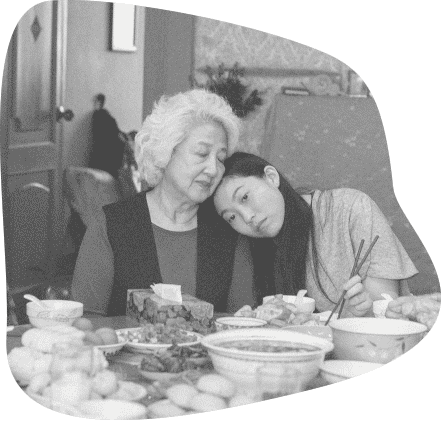
In this funny, uplifting tale based on an actual lie, Chinese-born, U.S.-raised Billi (Awkwafina) reluctantly returns to Changchun to find that, although the whole family knows their beloved matriarch, Nai-Nai, has been given mere weeks to live, everyone has decided not to tell Nai Nai herself.
To assure her happiness, they gather under the joyful guise of an expedited wedding, uniting family members scattered among new homes abroad. As Billi navigates a minefield of family expectations and proprieties, she finds there’s a lot to celebrate: a chance to rediscover the country she left as a child, her grandmother’s wondrous spirit, and the ties that keep on binding even when so much goes unspoken.
LANGUAGE
Mandarin
English
Japanese
Italian
SUBTITLES
Portuguese
CAST
Awkwafina
Tzi Ma
Diana Lin
Zhao Shuzhen
Lu Hong
Jiang Yongbo
SCREENPLAY
Lulu Wang
CINEMATOGRAPHY
Anna Franquesa-Solano
MUSIC
Alex Weston
EDITING
Matt Friedman Michael Taylor
A A24 PRODUCTION
LULU WANG
USA / China, Fiction, 2019, 100’
Billi is a young Chinese-American woman with a future yet to decipher. One day she discovers that her grandmother Nai Nai has been diagnosed with terminal cancer. The rest of the family decides to hide this diagnosis from Nai Nai and, in order to reunite the whole family one last time in China, organises a hasty wedding between one of her grandchildren and his recent girlfriend. Billi is against this decision, she just wants to say goodbye, to overcome her grief together with Nai Nai, in a way that seems natural to her, but she has been deprived of this possibility. Moved by the moral ambiguity she feels about her family's decision, Billi leaves for China to see her grandmother one last time.
Based on director Lulu Wang's personal experience, it shows us the humanity and love that are present in such a complex decision.
Rui Mendes, IndieLisboa
This film is about the power of convictions and what they do to justify and sustain our lives. To what extent can lies serve a purpose? How far should you go with a charitable lie? It's a story that shows us how there are limits to the ability to predict the future, what is called defining the prognosis, even with all the technology that modern medicine has at its disposal. Statistics, which gives us probabilities, is just as valid at the averages and medians as it is at the extremes. And it's extremes that this film talks about for the hour and a half it takes place. What we know about psychological adaptation to a cancer diagnosis tells us that it's better to be able to summon up the "fighting spirit" in patients. But if that spirit is already in the person, do they need another push to find even more reasons to "fight"? After all, with the truth or the lie, who are we protecting? The messenger or the receiver? Who is more afraid? Who tells the truth or who knows what they'd rather not have to know? The film lives between extremes that are meant to be opposites. But there is a middle ground, a middle point, which has to be found in the everyday clinic, in the encounter between people with rights and obligations. More important than what you say is how you say it.
dr Fernando Leal da Costa, IPO Lisboa
Screening presented by Dr Maria de Jesus Moura,
director of the Psychology Unit at IPO Lisboa
with the presence of Catarina Vasconcelos, the film's director,
and Pedro Fernandes Duarte, the film's producer

Beatriz married Henrique on the day of her 21st birthday. Henrique, a naval officer, would spend long periods at sea. Ashore, Beatriz, who learned everything from the verticality of plants, took great care of the roots of their six children. The oldest son, Jacinto (Hyacinth), my father, dreamed he could be a bird. One day, suddenly, Beatriz died. My mom didn’t die suddenly, but she too died when I was 17 years-old. On that day, me and my father met in the loss of our mothers and our relationship was no longer just that of father and daughter.
ORIGINAL TITLE
A Metmorfose
dos Pássaros
LANGUAGE Portuguese
SUBTITLES
English
CAST
Manuel Rosa
João Móra
Ana Vasconcelos
Henrique Vasconcelos
Inês Melo Campos
Catarina Vasconcelos
Cláudia Varejão
José Manuel Mendes
João Pedro Mamede
SCREENPLAY
Catarina Vasconcelos
CINEMATOGRAPHY
Paulo Menezes
SOUND
Adriana Bolito
Rafael Cardoso
EDITING
Francisco Moreira
PRODUCTION
Pedro Fernandes Duarte
Joana Gusmão
Catarina Vasconcelos
Maria Inês Gonçalves
A Primeira Idade PRODUCTION
CATARINA VASCONCELOS
Portugal, Documentary / Fiction, 2020, 101’
One of the breakthrough films of recent years in Portugal is the most awarded film of all time at film festivals, entitled to be the Portuguese representative under consideration for the Oscars, screened on Netflix and, last but not least, with one of the most successful commercial premieres worthy of study.
That said, The Metamorphosis of Birds, Catarina Vasconcelos' first feature, is a solar film that works like an information puzzle in which all the pieces fit together in absurd and uncompromising perfection, as does every rigorous shot in the film, every word narrated and spoken, every sound intoned. The story of a family, through its different generations, who represent each other, transforms this family film into an epic that reinvents itself to the point where it always moves us at a different point and according to each viewer's own state of mind. And this is where the film soars and where the talent of the author is shown, who has the gift of creating an empathetic relationship between each film and those who watch it.
Perfection at the end of the IPO Lisbon 100 Years Film Showcase.
Miguel Valverde, IndieLisboa
A love story blessed by God. Henrique and Beatriz meet and build a relationship with many challenges to overcome. The fear of isolation, uncertainty, distance and loss are a constant in a relationship that lives and survives the distance and hardships of life. A relationship marked by distance, but capable of bearing fruit, their six children help to maintain and perpetuate the flame and look to the future. The building of a large family and the development of bonds that are established and developed with each of them in a special way.
A story that has a narrative with intense and profound dialogues based on memories, recollections and the sharing of events that are narrated and transcribed in letters that, although they alleviate the longing of distance, express the pain and suffering of loss and simultaneously nurture the relationship in proximity and dependence.
Beatriz, a special woman, tries to illuminate her daily life through her maternal role and her intense contact with nature. Always caring in a discreet and simple way, but also seeking to find her inner peace with nature.
Children grow up and question their parental role. They too, each in their own way, have to deal with the loss; of the father who is not present in their daily lives, of the childhood that is fading into time and of the profound changes in social life.
The presence of "still lifes" that in photography in a unique and artistic way accompany with melody the internal language of each one of us, in contact with our metamorphoses.
It talks about the cycle of life, the stories and memories of those who leave, as well as those who stay and the way in which they elaborate and grow, and this process is transgenerational. Their descendants seek to make sense of all these experiences, building a legacy based on the bonds established between parents, children and grandchildren, which is renewed with each new cycle of life.
The narrative of The Metamorphosis of Birds is also a way of paying homage to Triz, and to all those who leave and remain with us in the baggage they leave us.
dr Maria de Jesus Moura, IPO Lisboa